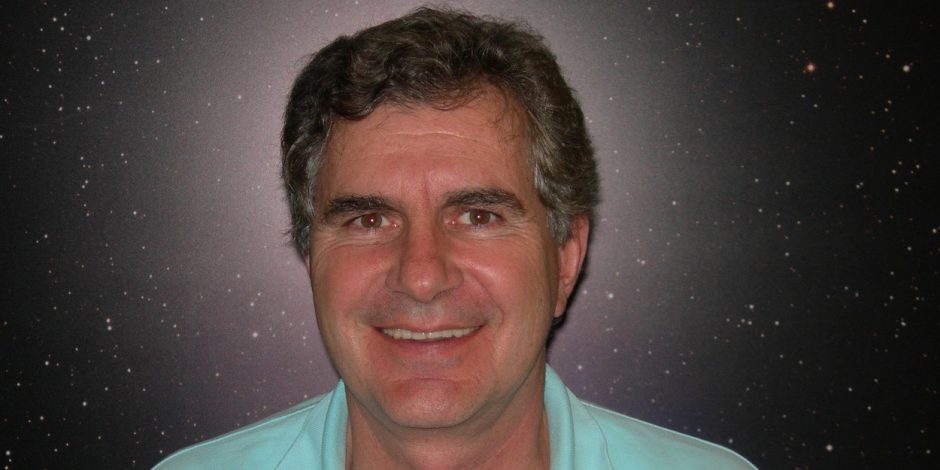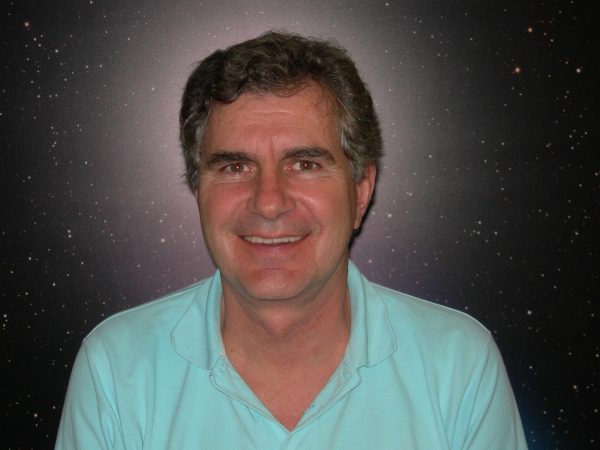A sinuous career path

In previous editions of the InsiderS, we have already portrayed astronomers and physicists who have made their careers outside academia. Here is the story of PlanetS member Pierre Bratschi who is in charge of communication and outreach at the Geneva Observatory.
By Pierre Bratschi
As a child, I didn’t dream of being an astronomer, I looked at the sky like most children, but it never occurred to me to make it my job. After a standard education, primary, secondary, middle and high school in Geneva, I was not sure in which direction to go. I chose the Ecole Polytechnique Fédérale de Lausanne more because I had ease in math and physics than because I liked it. So I became an electrical engineer and worked as such for a few years, notably at Hewlett Packard in Geneva. I quickly realized that the engineering profession was not for me, it was also a time where I started looking at the sky so assiduously that I bought a 20-centimetre diameter telescope, a Celestron on which I had mounted a security camera and programmed its equatorial mount with a mini computer. In the early 1990s, CCD cameras and automatically controlled telescopes did not exist. I was very proud of my installation and invited my friends to look at the sky in winter on a screen while staying in the warm!
Disappointed and not in line with my engineering activities, I decided to return to university to become an astronomer. So I followed the courses given by the astronomy department of the University of Geneva while giving computer science courses to be able to live. After passing the exams which at the time had to correspond to the equivalent of a master’s degree, I was hired as a doctoral student on a rather technical and observational project, which led me to go several times a year to La Silla for the duration of my thesis.
It was precisely during one of the missions in Chile that I had the opportunity to witness a total eclipse of the sun for the first time in 1994. The despair of Chileans to get special safety eclipse glasses gave me an idea, I knew that in 1999 400 million Europeans would witness the same phenomenon and that they would need glasses. After defending my thesis, I left the astronomy department to start producing “eclipse” glasses. A small start-up of which I was the boss, secretary and worker, I manufactured alone about 300,000 pairs in a little over six months.
Once the eclipse passed, it was necessary to rethink the future of my professional career. To give me some time to think, I worked as a Help Desk on a big IBM at until the day an advertisement appeared in the newspaper saying that RTS was looking for a scientific journalist. I said to myself, ” it’s me they’re looking for,” I applied and was hired. I spent seven years at the radio station in Lausanne, it was very interesting, exciting and corresponded to what I liked, even if some aspects were demanding, I think in particular of the endless days, the surrealist work schedules (starting work at 3am, weekend) and the Geneva-Lausanne journeys. That said, I experienced extraordinary moments such as Cassini’s placement in orbit around Saturn live from Passadena, the laying of the European Huygens probe on Titan from ESA’s control centre or the negotiations during the conference on global warming in Bonn with Philippe Roch, the then Director of the Federal Office of the Environment. I have been involved in the treatment of shattering but much less funny events such as the attacks of 11 September 2001 in New York or the 2004 Christmas tsunami in Asia.
After these seven years in the Central, I wanted to extend my field of action, my wife being Argentina, I suggested her to move to Buenos Aires where I would become the correspondent for South America, enthusiastic she accepted, just like the Radio. So I spent nine years in Argentina as a correspondent for Swiss Radio, for the newspaper Le Temps and occasionally for some other media. During all these years, I have covered the actuality of the continent in all fields, with events that will remain forever engraved in my memory, such as the rescue of Chilean miners trapped 3 months at 700 metres underground, the death of Hugo Chavez, the eruption of the Puyehue volcano in Argentine Patagonia or the hysteria triggered by Roger Federer’s first visit to Buenos Aires. As I also worked for the science program CQFD, I always stayed in touch with scientific news and more particularly with astronomy, as the large Chilean telescopes were only two hours away by plane from my place of residence. I was able to discover incredible sites like ALMA or Cerro Pachon (Gemini).
And then one day, I remember it was in December 2013, I received a call from Switzerland: “Hi it’s Stéphane Udry”, I knew Stéphane well, we did our thesis at about the same time, “we got a NCCR on exoplanets and I need a journalist who knows astronomy and vice versa, do you care? ». I hadn’t planned to go back to Switzerland, but I was getting tired of having to run after work. The situation in Argentina was not good and I liked the prospect of returning for a new challenge. So I started my communication and outreach work on September 1, 2014. It’s now been a little over 5 years and if I sometimes miss the thrilling stress of a hot news story, I don’t regret my decision under any circumstances. NCCR is an extraordinary brain emulator.
The lesson I have learned from this rather tortuous path is the following: it is because I was an engineer that I became an astronomer, it is because I was an astronomer that I saw an eclipse and had the idea of glasses, it is thanks to the glasses that the radio hired me (the director confessed it to me well afterwards), it is because of the radio and astronomy that I am a member of the NCCR. Seizing opportunities without worrying about the future has guided my professional life and this philosophy has allowed me to have a career path full of sometimes anxious uncertainties, but of a richness that I would never have imagined when I finished my studies.
InsiderS no. 18: Annette Jäckel, grants advisor, University of Bern
InsiderS no. 17: Stéphane Berthet, Vice-Rector of the University of Geneva
InsiderS no. 16: Andreas Hirstein, science editor, NZZ am Sonntag
InsiderS no. 15: Bettina Zahnd, head of accident research, AXA
Categories: Internal Newsletter, Uncategorized


